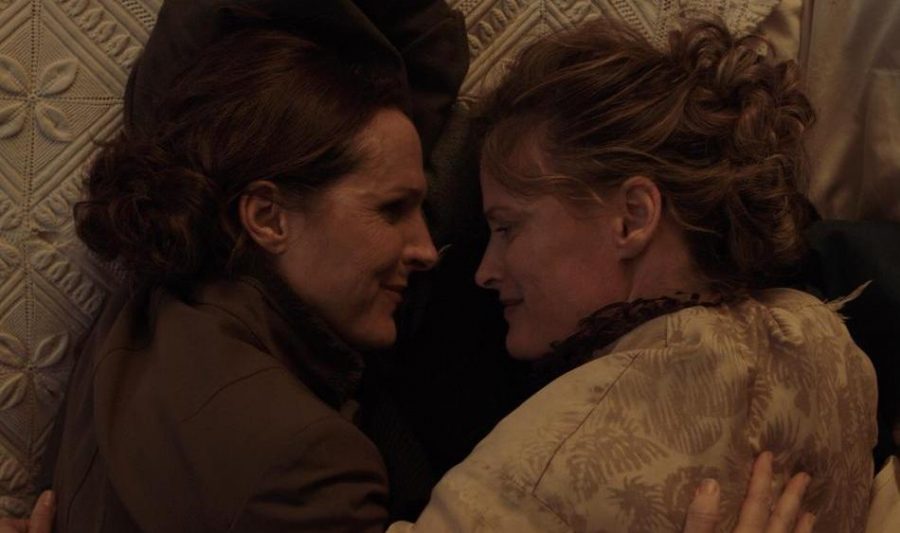Everyone knows the story of the 19th-century American poet Emily Dickinson: she was a spinster and a recluse, and she wrote her poems without intending for them to ever be published.
“People have been so indoctrinated with that story about Emily Dickinson,” said filmmaker Madeleine Olnek (Tisch ‘87), director and screenwriter of the new comedy-drama “Wild Nights with Emily.” But Olnek, who participated in a Q&A at a screening of the film this weekend at Quad Cinema, knew there was more to the story than that.
A 1998 New York Times article complicated this narrative for Olnek. New technology had revealed that the name of Emily’s friend and sister-in-law, Susan Huntington Dickinson, had been erased from several of Emily’s letters and poems. The article was Olnek’s introduction to the theory that the relationship between Emily and Susan was romantic, an idea expanded on in the 1999 book “Open Me Carefully,” a collection of their letters.
“Wild Nights with Emily” takes the idea that Emily and Susan were in love and runs with it. The film, featuring comedian Molly Shannon (Tisch ’87) as Emily, is a warm, funny look at a complicated woman that history has flattened into a one-dimensional trope.
The relationship between the two women, sparked when they were teenagers and continuing through their adult lives until Emily’s death, is the heart of the film.
“[Susan] was so important to Emily,” Olnek said. “They did have this relationship that was also an intellectual one. Susan was Emily’s first reader and her critic and her muse.”
Emily is eager for her work to be published, and eager to share it with Susan (Susan Ziegler, Tisch ’87), the subject and inspiration for many of her poems; she wrote more letters to Susan than to any other person in her life. A sample: “Susan knows / she is a Siren – / and that at a / word from her, / Emily would / forfeit Righteousness – .”
Olnek deftly incorporates some of Emily’s poems into the film, having the characters address them to the audience to clue us into their states of mind. She includes subtitles so that we’re able to appreciate the way Emily’s unusual punctuation and capitalization supplements and sharpens her verse.
“Part of the idea of this movie was hearing her own words and her own letters, so that the audience could judge [the nature of their relationship] for themselves,” Olnek said.
The stranger-than-fiction aspect of the story extends to the framing device, a posthumous reading of Emily’s work by the woman who collected and edited her poetry and letters after Emily’s death: Mabel Todd (played by Amy Seimetz), the longtime mistress of Susan’s husband Austin, who is also Emily’s brother.
It was Mabel who was largely responsible for propagating the idea of Emily as a recluse, and it was likely she who erased Susan’s name from Emily’s papers. She was also partially responsible for editing Emily’s poems to bring them more in line with poetical conventions of the time, removing the idiosyncrasies that make them stand out today.
“For a woman at that time, to be as rebellious as Emily Dickinson was, to live life on her own terms, and to be writing these poems which were frankly erotic, that wasn’t a woman that could be celebrated,” Olnek said. “It had to be the shy recluse who never wanted anything published.”
It was at NYU that Olnek first met Molly Shannon, who would go on to have a rich and successful career in comedy, including an iconic stint on Saturday Night Live. But her dramatic chops are more than up to the task of the role, infusing Emily with both her signature expansive humor and a delicate pathos.
“She was the only person I wanted to play the role,” Olnek said. “I felt like if Molly Shannon played Emily Dickinson, people would finally understand who she was.”
“Wild Nights with Emily” is based on a play of the same name Olnek staged at the WOW Café Theatre in 1999. Unlike many others set in the past, the film has a fresh immediacy to it. Olnek’s focus wasn’t period accuracy so much as telling a truthful, human story.
“Reading these papers written by people in the 1800s, I was surprised at how contemporary they were,” Olnek said. “I wanted us to focus on these characters as people, and it was about what they wanted, and not about the idea that we were doing something period.”
Olnek hopes that her film helps to correct the historical record, but also that it will give Emily’s readers a better appreciation for her work.
“There’s so much eroticism, passion, love, joy in her poems, and part of the issue with having this other image of Emily Dickinson was that it would make it so that people couldn’t understand her poetry,” Olnek said. “It’s really showing Emily as she was.”
Email Alex Cullina at [email protected].
























































































































































